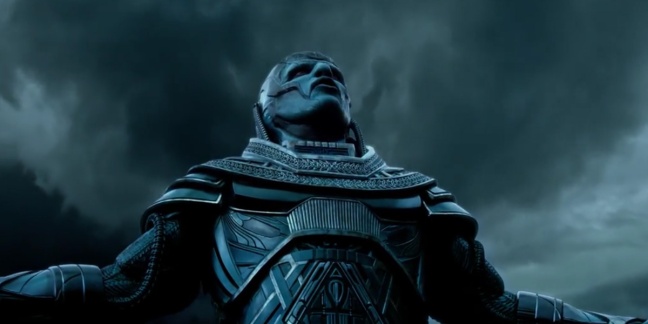DARK PHOENIX V. APOCALYPSE
“You are all my children…”
-En Sabah Nur (Apocalypse/The First One)

X men: Apocalypse, the title of this X-month’s box office release from Fox Studios. Bryan Singer’s new film promised to bring fans to the edge of their seats in the cinemas as they were treated to the story and visuals from the film. Although many critics right now have not really been impressed by the movie since its release this month, it still carries some elements that are worth examining as far as adaptations of comic book story lines and themes are concerned. Let’s begin, shall we?
In the intro of the film, we are treated to the first elements that introduce the movie as something of a theological thriller; this can be credit to the fact that the film begins by showing a time sequence going through major historic events. One of the surprising ones was Jesus’ crucufixion. Odd as it might be the pace of the ‘history montage’ as I would like to call it, at the beginning of the film briefly poses and slows down before quickly going through other significant events that lead up to the modern day (i.e. the 1980’s). This is after a brief introduction of Apocalypse’s introduction is given at the very start. Though highly suggestive, there’s room for argumentation.
Later on in the film, hints and blatant remarks and on-the-nose commentary on Apocalypse’ role in the movie are constantly made (just in case we, the viewers forgot). From comments about Apocalypse being ancient (McTaggart [whose character is something of a background character]), to his role and greatness rivaling biblical power and authority, even down to the constant reminder from Apocalypse [the main antagonist] that he is (or has been known in history as) “Yahweh, Krishna, Elohim” has shown the movie to be somewhat equal in essence to DC’s Batman v. Superman which was released earlier on this year.
Although I do agree that in the comics, characters such as DC’s Superman, Dark Seid, Wonder Woman, and Marvel’s Apocalypse, (and soon to be seen on screen’s) Thanos are shown to be characters with either a god complex or a god-like power or authority. Even though such is the case, the movie, X-Men Apocalypse has some elements introduced into the main atagonist’s character that remind us of Greek Philosophy. One of these elements has got to be the one made by Christianity, Islam and Judaism regarding the First Cause and the Power Inconceivable (as I would like to call it). The first argument basically states that nothing comes into being in and of its own volition and as such everything visible and invisible has to be attributed as coming from somewhere–more precisely, from someOne. The second argument implies that if a person can conceive of a being with greater power than the ones that he/she knows, then there is a likelihood that such a being to exist by the sheer fact that we can conceive of such a being; this ladder goes on until we arrive at the intellectual conclusion that there is a being greater than all who must himself be God, as the argument goes.
What brings these arguments in cohesion with the film, is that Apocalypse is narrated/presented throughout the film as being extremely powerful. An aspect that is shown to have come to be through his stealing of other beings’ powers that were more powerful than he. This is the way in which Apocalypse is presented through the second argument to truly be a god. So, to further his claim to godhood, he seeks to take Charles Xavier’s gifts of telepathy and mind control to quote en quote ‘have the power to be everywhere and anywhere at any time, and to be able to bend the will of men to his own’.
What’s disturbing about Apocalypse desire is that it parallels another Greek story about Icarus who ‘flew too close to the sun and perished’. Apocalypse builds a pyramid to echo his glory and further throw at the viewers his ‘deserved’ enthronement above all mankind so that he may rule over them all. The problem is when, like in the arguments (referenced above) are introduced into the picture, we see that Apocalypse was truly a mere mortal and was capable of death. This takes place when Jean Grey channels her ‘true’ power, the non-mutant, cosmic power of the Dark Phoenix. This is what destroys the foe and turns him to ashes. And for anyone who would like to creeped out a little bit, it is a few seconds prior to this that Apocalypse whispers, ‘Finally, it is here to complete my work’ (my paraphrase) [his true ‘child’ has come to be!].
Bottom line, there is much to be reflected on from this movie. Apocalypse is a good reason why the claim to divinity is unattainable by any mortal. On the flip side, the cosmic dwarfs the mortal abilities of men and is the superior form of power. It is in this realm that we see that room is created there for another being with greater power than Jean’s in the X-verse (X-men Universe). With that being said, what do you make of these comic book characters and the themes behind their various natures?
Be blessed as we continue with the journey into theology and nerd-dom!